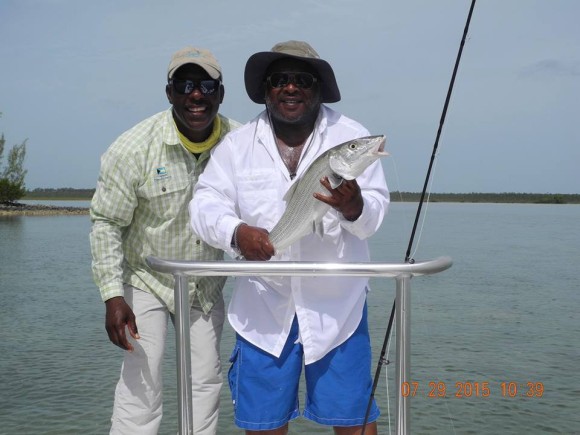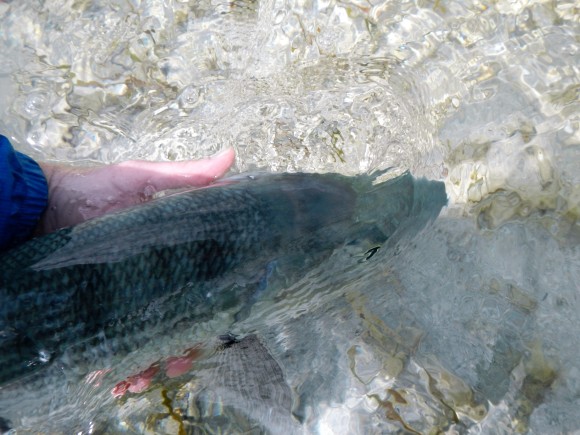The Bahamas Fly Fishing Industry Association’s (BFFIA) president yesterday hailed imminent regulations to govern the sector as “one of the biggest pieces of legislation to come about since 1967”, as “closing the loopholes” will increase foreign currency earnings for Bahamians. (full story here)
1967 was the year the Bahamas became an independent nation. Yes… Prescott is saying his fly fishing regulation law is one of the most important things since Bahamian home rule. That doesn’t sound like an overstatement at all, does it?
Gone is any pretense that this is about conservation. If you recall the first days of this particular episode of this fight it was shrouded in envrio-speak. It was to protect the fish. But it never was about that. It isn’t even about what the regulations say or do now. There is a long game here and this is just part of it.

Mr Conservation, demonstrating proper handling of a bonefish.
Prescott, as he says himself, has been fighting this battle for 23 years. He’s not done. He’s laying a foundation.
“Most people don’t realise(sic) that because they hear the term ‘fly fishing’, but it’s the first piece of legislation that lays the foundation for building ownership by local Bahamians. It doesn’t matter your economic standing; there is something in this industry for you to lay claim to. That is what the legislation does. This is so huge.”
This is about who owns the lodges and where the money goes. Prescott doesn’t like foreign owned lodges since they are the competition and they are competitors that book more days at higher prices. They have more access to capital. They have nicer boats. They “speak American” in a sense and know how to meet client expectations. A lot of the big lodges are foreign owned, maybe all the big ones, but there are several Bahamian owned lodges as well. Water Cay and Swain’s Cay come to mind.
The way Prescott sees it, every dollar spent in the Bahamas that doesn’t go to a Bahamian is a kind of national crime, a continuation of economic colonialism. The first draft of the legislation we saw took aim at foreign owned lodges, despite there being ample legislation on the books about how investments in the Bahamas could be made. The aim, the long game, really is about getting rid of foreign owned lodges.
In the legislation snuck through there is little that impacts most DIY fishing, unless you had your own skiff or rented one while there. There is a license you need to purchase (the actual mechanics for that seem to be mostly FUBAR, but that’s another post). However, think of the long game here. Prescott seems to see any anglers fishing Bahamian flats without paying a Bahamian guide as stealing directly from the guide community and it is very much in his long term plan to change that.
Now, you can claim I’m doomsaying and you can say the regulations don’t limit DIY fishing, but let’s see how the regulations are enforced, how the licensing mechanisms work and let’s see what comes next. I’m gazing into the future here a bit, but I also have talked to a lot of people who have known Prescott for years and they all say this is where he has long said he wants to go. I just think I see the path he’s taking.
Prescott, and his supporters in the guide community and in the government, have been sold on the idea you can convert every second-home owner into a fly fishing guide client and every DIY angler can and will pay for a guide to fish the Bahamas. They also believe foreign lodge owners can be pushed out, and maybe the booking agents as well and that when it is all in Bahamian hands it will be an economic boon.
They believe, when all is said and done, this legislation will result in more days booked with Bahamian guides at Bahamian lodges and more money will be spent and will stay in the Bahamas.
Those of us opposed to this legislation disagree with that math. There will be fewer guide days booked in 2017 than in 2016, especially for independent guides. Bahamian lodges that struggled before will continue to struggle. Second home prices will drop and the economic boost construction and remodeling gave will disappear. Places like Ragged may never get fished (legally) while the legislation stands (a place with 67 inhabitants is unlikely to be able to support a licensed guide). Businesses which rent lodging or cars or boats or provide meals to DIY anglers will suffer. In short, we believe you can’t dictate too much to your consumers, your clients without it coming back to bite you in the arse.
Beyond just what it does to anglers, how about the fact that under this legislation a local Bahamian going out and catching a mutton snapper in 5 feet of water will need a license and could be fined if he doesn’t have one. A license fee or fine is a big deal in a place with a minimum wage of $4.00/hour and unemployment over 14%. The birthright of every Bahamian to go catch their dinner in the sea was just voted away behind closed doors. No one even seems to know it has happened.
The wounds will be self-inflicted and they will be deep and I honestly think we’ve only seen a glimpse of what gets built on this foundation.

Was this my last Bahamian bonefish?
- If you liked the story above, check out these stories below
- Bahamas Winners and Losers (1.000)
- The Clock Running Out & The Quebec Connection (1.000)
- What Bahamians Need to Know (1.000)
Tags: Bahamas Regulations




You hit the nail on the head with your take on most of this but one thing needs to be corrected. A personal angler license is only needed to flats fish for the 5 named species. Anyone can fish for snapper or any other unnamed fish species on the flats without a license according to Minister Gray in the December 8th meeting.
Bahamian’s do need a personal angler license to catch one bonefish for dinner or to participate in the conservation technique of catch and release fishing of the 5 named species on the flats.
How can you tell if someone is fishing for snapper or bonefish? I mean, you can catch a mutton on bonefishing gear and you can catch a bonefish on snapper gear. That seems hard to split hairs on in the real world.
I am just a bit confused about the reference to cobia – don’t know any cobia that live in the flats. Where did that come from?
They just seemed to throw that in there. No one is sure why.
Sure seemed strange to me….Never heard of much cobia caught in the islands – not to mention on the flats 🙂 perhaps they should have mentioned wahoo or tuna –
Ahhh, the mystery cobia. We are all scratching our heads over that one. Yet another zinger added by he who shall remain nameless. Please let me know if anybody that reads your blog tells you they have ever caught a cobia on the flats anywhere in the Bahamas.
As per your first comment. How can you tell? Do not EVER wipe the slime on your pants. Happy snapper fishing!
This entire regulation is draconian and contradictory and makes very little sense when you try to understand what it means. A guide of 10 years experience has one year to get certified and licensed. Guess how long a guide of 3 years has to meet the requirement? One year of course.
Welcome to the Bahamas…. will make it my mission to find a cobia cruising the flats….will be a life-long mission but…could be fun!
[…] LINK (via: Bonefish on the Brain) […]
Bjorn,
Nice write up here also.
http://coastalanglermag.com/abaco-fly-fishing-guides-association-blasts-new-bahamas-flats-fishing-regulations/
Jason
[…] For the best summary thus far on the state of The Bahamas’ populists movement and its possible negative impact on your bonefishing trip there, read Bjorn Stromsness’ insightful comments here . . . […]
Cobia are a prized target on the flats in Florida, often cruising on the backs of rays. When I am in the Bahamas I never bonefish, only cobia fish. Still looking for first one though, after over 20 years. Sounds like I will never travel to Bahamas again. Being a retired guide from Florida, I can only afford to fish DIY.